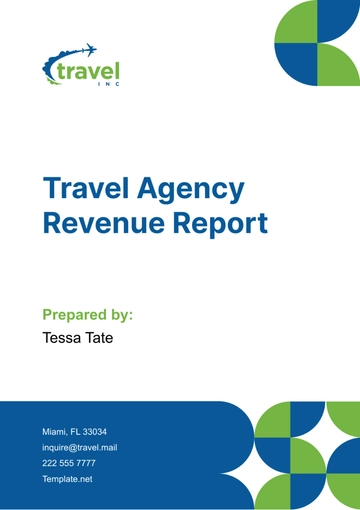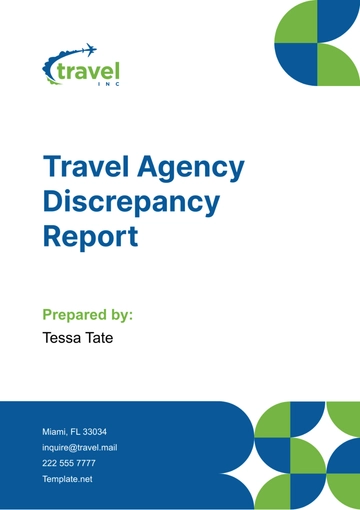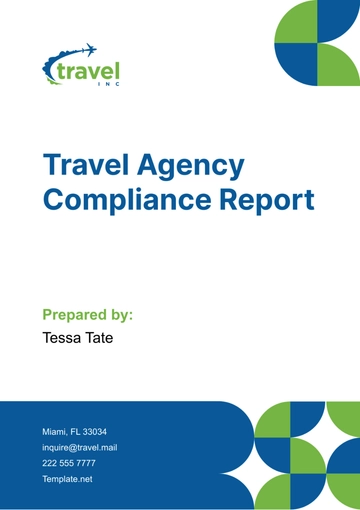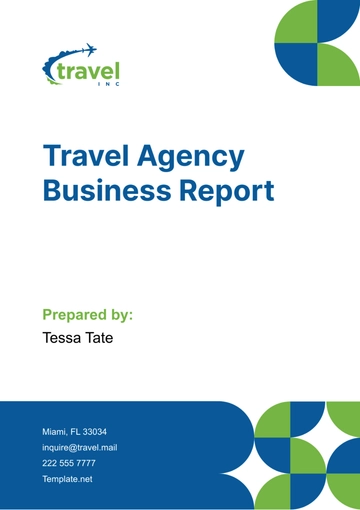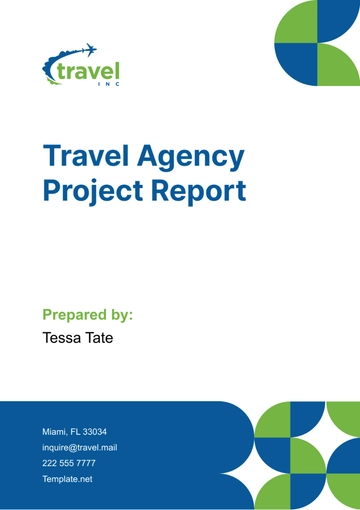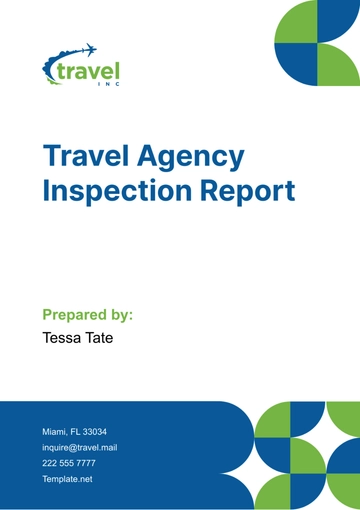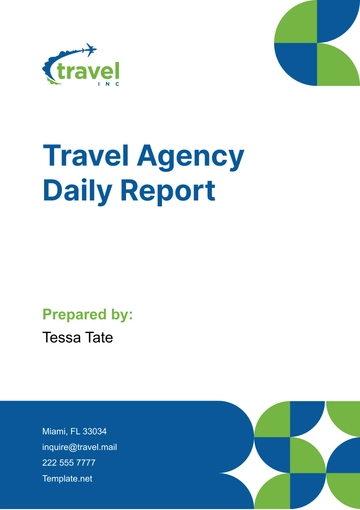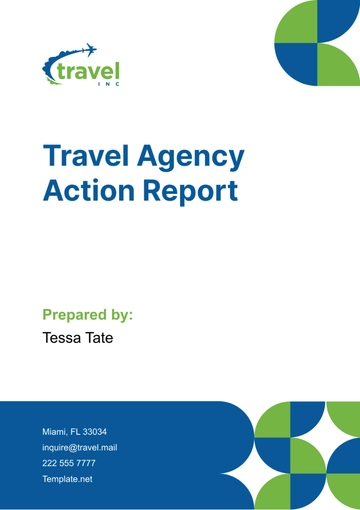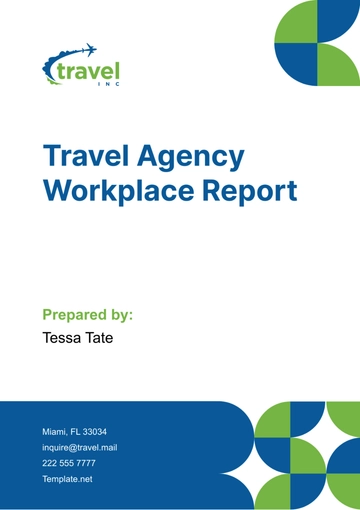Free Travel Agency Discrepancy Report
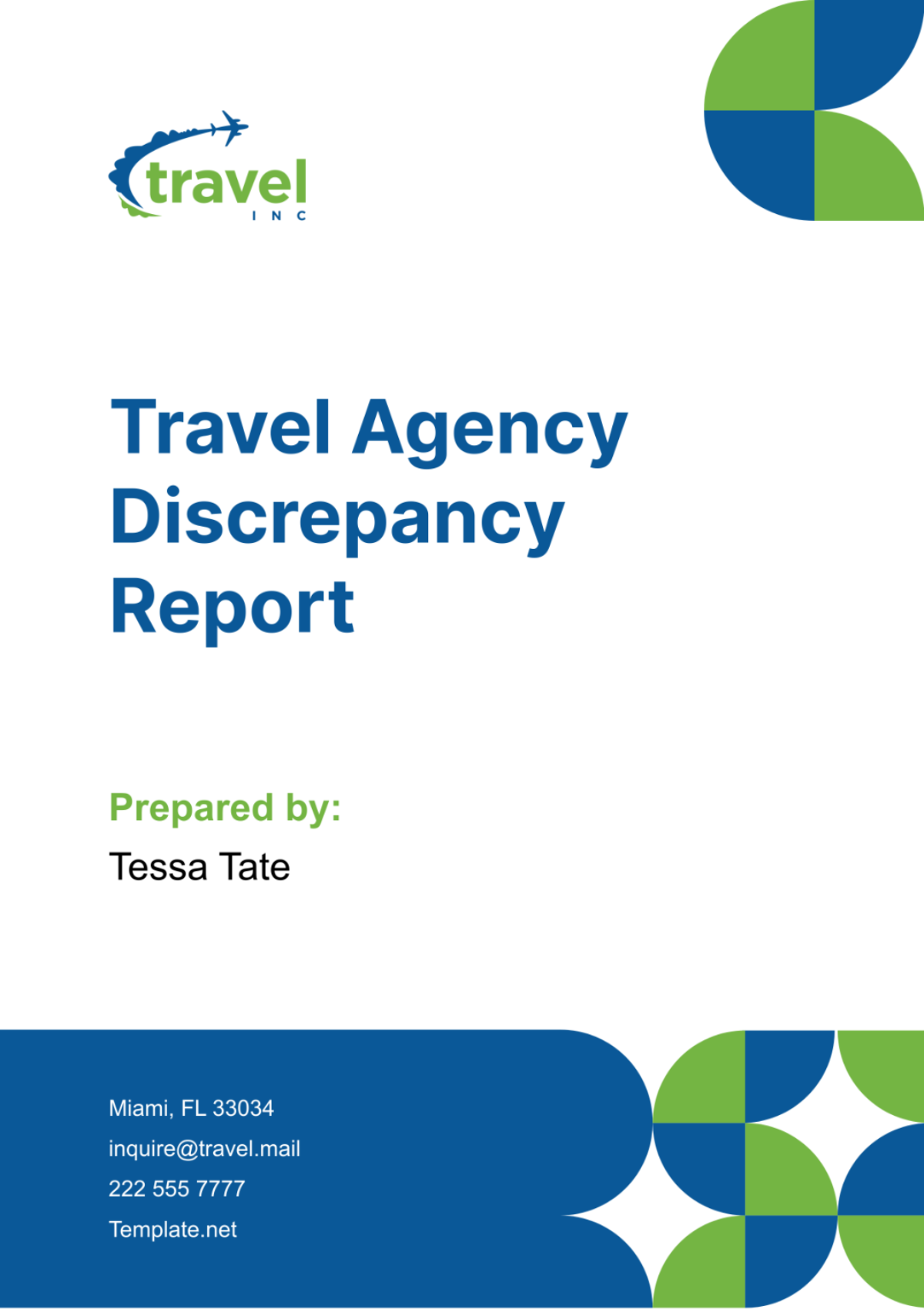
I. Executive Summary
This Travel Agency Discrepancy Report provides a focused examination of operational discrepancies encountered by [YOUR COMPANY NAME] during the most recent reporting period. It highlights critical areas where errors have negatively impacted customer satisfaction and financial performance, including booking inaccuracies, pricing mistakes, and failures in service delivery.
Over the course of this period, our audit team identified discrepancies in approximately 12% of all transactions, an increase from 9% in the previous period. These issues not only led to a 5% increase in customer complaints but also resulted in an estimated financial loss of around $120,000 due to refunds and compensatory actions. Key findings include:
Booking Errors: 30% increase in mismatches between client requirements and actual bookings compared to the previous year.
Pricing Mistakes: Over $50,000 lost due to discrepancies between quoted and charged prices.
Service Non-Deliveries: 15 reported instances of paid-for services not being provided as agreed, affecting our brand reputation.
Immediate and strategic actions are outlined in subsequent sections to address these discrepancies. By focusing on enhanced staff training, software upgrades, and rigorous quality checks, [YOUR COMPANY NAME] aims to reduce these occurrences and improve overall service quality, thereby restoring client trust and stabilizing our financial performance.
II. Description of Discrepancies
During routine operational checks, our audit team has cataloged several discrepancies that have impacted our service delivery and client satisfaction. Each type of discrepancy is categorized and described below to provide a clear understanding of the ongoing issues and their frequency.
Types of Discrepancies Identified:
Booking Errors: These occurred when the travel arrangements made did not align with the client’s specified requirements, leading to cancellations and necessary re-bookings. Common issues included incorrect travel dates, destination mismatches, and unsuitable accommodation bookings.
Pricing Mistakes: Errors in this category were primarily due to system glitches or miscommunication between booking agents and clients. These mistakes often resulted in clients being overcharged or quoted prices that were not honored during billing.
Service Non-deliveries: In several instances, services such as airport transfers, city tours, or hotel reservations that clients had paid for were either not provided or did not meet the promised standards. These failures were frequently attributed to miscommunications with service providers or oversights in service confirmation.
Detailed Breakdown of Discrepancies:
Type of Discrepancy | Number of Occurrences | Estimated Financial Impact | Percentage of Total Transactions |
|---|---|---|---|
Booking Errors | 120 | $40,000 | 7% |
Pricing Mistakes | 75 | $50,000 | 4.5% |
Service Non-deliveries | 15 | $30,000 | 0.5% |
This table illustrates the scope and financial impact of each discrepancy type, emphasizing areas requiring immediate attention and improvement.
III. Analysis of Impact
The discrepancies identified have significant implications for both our clients and our agency. This section delves into the consequences of these issues, analyzing customer feedback and the broader financial effects on our operations.
Customer Impact: Feedback collected from affected customers indicates a marked increase in dissatisfaction, which has manifested in a 5% rise in formal complaints and negative online reviews. The majority of grievances are related to booking errors, which have not only inconvenienced customers but also deterred some from using our services again.
Financial Impact: The financial ramifications of these discrepancies are considerable. Apart from direct losses due to refunds and compensatory expenses, there is an indirect cost related to diminished customer loyalty and potential future revenue losses. The breakdown below provides an insight into the financial strain these errors have imposed:
Type of Discrepancy | Direct Financial Loss | Indirect Costs (Estimated) | Total Cost |
|---|---|---|---|
Booking Errors | $40,000 | $20,000 | $60,000 |
Pricing Mistakes | $50,000 | $15,000 | $65,000 |
Service Non-deliveries | $30,000 | $10,000 | $40,000 |
These figures underscore the need for robust corrective measures to mitigate the financial impacts and restore the agency’s credibility and profitability.
The data and customer feedback analyzed in this report clearly demonstrate the adverse effects of operational discrepancies on customer satisfaction and financial health. Addressing these issues through targeted improvements in operational processes and customer service is crucial for enhancing our competitive edge and ensuring long-term success.
IV. Recommended Solutions
To effectively address the discrepancies identified and mitigate their impact, [YOUR COMPANY NAME] proposes a comprehensive set of solutions categorized by the type of discrepancy. These solutions are designed to enhance the accuracy and reliability of our services, thereby improving customer satisfaction and reducing financial losses.
1. Enhanced Training for Booking Staff:
Objective: Reduce human errors in booking processes by improving the skills and knowledge of the booking team.
Action Plan: Implement a rigorous training program focused on accuracy, customer service, and detailed verification of client requirements. This training will include:
Scenario-based workshops to handle complex booking situations.
Regular refresher courses to keep staff updated on new technologies and travel products.
Expected Outcome: A 50% reduction in booking errors within the next six months.
2. Software Upgrades:
Objective: Minimize technical mishaps that lead to pricing mistakes and booking errors.
Action Plan: Invest in state-of-the-art booking and invoicing software that features enhanced error-checking capabilities and real-time price updates. This upgrade will involve:
Selecting a software solution with proven reliability and excellent support services.
Training staff to effectively use the new system to its full potential.
Expected Outcome: Decrease pricing mistakes by 60% and enhance overall operational efficiency.
3. Quality Assurance Checks:
Objective: Ensure that all services are delivered as promised to the client and meet the agency’s quality standards.
Action Plan: Develop a quality assurance protocol that includes regular audits of service providers and follow-up with clients to confirm service delivery. Key steps include:
Monthly reviews of major service providers based on customer feedback and compliance with service standards.
Implementation of a client satisfaction survey post-travel to gather direct feedback on services received.
Expected Outcome: Improve service delivery compliance to 95% and enhance customer satisfaction ratings significantly.
4. Strengthened Communication Channels:
Objective: Enhance the clarity and timeliness of communication between booking agents, service providers, and clients.
Action Plan: Introduce a centralized communication system that allows for real-time updates and notifications to all parties involved in the travel arrangement. This will include:
Utilization of an integrated CRM system that provides staff with immediate access to all client interactions and booking details.
Regular training sessions for using the communication tools effectively.
Expected Outcome: Reduce service non-deliveries by 80% and improve client communication satisfaction scores.
V. Implementation Plan and Monitoring
Implementation Timeline:
Q1 2050: Selection and deployment of new software systems.
Q2 2050: Staff training on new software and customer service enhancements.
Q3 2050: Launch of quality assurance checks and introduction of the centralized communication system.
Q4 2050 and Beyond: Ongoing monitoring and adjustment of strategies based on feedback and performance data.
Monitoring and Evaluation:
Booking Errors and Pricing Mistakes: Monthly reviews will be conducted to assess the number of discrepancies, with findings reported to management. Adjustments to training and software will be made based on these reviews.
Service Delivery: Customer satisfaction surveys will be issued post-travel to assess service quality. Providers with poor reviews will undergo further scrutiny or be replaced.
Overall Impact: Quarterly performance reports will evaluate the overall success of the implemented solutions in reducing discrepancies and improving financial and customer satisfaction metrics.
VI. Conclusion
While [YOUR COMPANY NAME] has encountered several challenges related to service discrepancies, this report outlines a robust plan to address these issues decisively. By focusing on targeted training, advanced technological tools, stringent quality checks, and improved communication strategies, we are committed to significantly enhancing our service delivery.
The recommendations and actions outlined in this document are designed to not only rectify current problems but also to lay a strong foundation for continuous improvement. This proactive approach will ensure that [YOUR COMPANY NAME] not only meets but exceeds client expectations, reinforcing our reputation as a reliable and customer-focused travel agency.
Prepared by: [YOUR NAME]
Company: [YOUR COMPANY NAME]
Department: [YOUR DEPARTMENT]
Date: [DATE]
This comprehensive strategy will empower our team, reassure our clients, and build a more resilient and profitable business model. By addressing these discrepancies head-on, [YOUR COMPANY NAME] is taking a significant step forward in its commitment to excellence and customer satisfaction.
- 100% Customizable, free editor
- Access 1 Million+ Templates, photo’s & graphics
- Download or share as a template
- Click and replace photos, graphics, text, backgrounds
- Resize, crop, AI write & more
- Access advanced editor
Explore precision in discrepancy management with Template.net's Travel Agency Discrepancy Report Template. Tailored for meticulous professionals, it offers a comprehensive framework for identifying and resolving discrepancies swiftly. Utilize our AI editor tool for seamless customization and adaptation to your unique requirements. Stay ahead of challenges with editable features designed to enhance efficiency. Empower your discrepancy reporting process with Template.net's innovative solution.
You may also like
- Sales Report
- Daily Report
- Project Report
- Business Report
- Weekly Report
- Incident Report
- Annual Report
- Report Layout
- Report Design
- Progress Report
- Marketing Report
- Company Report
- Monthly Report
- Audit Report
- Status Report
- School Report
- Reports Hr
- Management Report
- Project Status Report
- Handover Report
- Health And Safety Report
- Restaurant Report
- Construction Report
- Research Report
- Evaluation Report
- Investigation Report
- Employee Report
- Advertising Report
- Weekly Status Report
- Project Management Report
- Finance Report
- Service Report
- Technical Report
- Meeting Report
- Quarterly Report
- Inspection Report
- Medical Report
- Test Report
- Summary Report
- Inventory Report
- Valuation Report
- Operations Report
- Payroll Report
- Training Report
- Job Report
- Case Report
- Performance Report
- Board Report
- Internal Audit Report
- Student Report
- Monthly Management Report
- Small Business Report
- Accident Report
- Call Center Report
- Activity Report
- IT and Software Report
- Internship Report
- Visit Report
- Product Report
- Book Report
- Property Report
- Recruitment Report
- University Report
- Event Report
- SEO Report
- Conference Report
- Narrative Report
- Nursing Home Report
- Preschool Report
- Call Report
- Customer Report
- Employee Incident Report
- Accomplishment Report
- Social Media Report
- Work From Home Report
- Security Report
- Damage Report
- Quality Report
- Internal Report
- Nurse Report
- Real Estate Report
- Hotel Report
- Equipment Report
- Credit Report
- Field Report
- Non Profit Report
- Maintenance Report
- News Report
- Survey Report
- Executive Report
- Law Firm Report
- Advertising Agency Report
- Interior Design Report
- Travel Agency Report
- Stock Report
- Salon Report
- Bug Report
- Workplace Report
- Action Report
- Investor Report
- Cleaning Services Report
- Consulting Report
- Freelancer Report
- Site Visit Report
- Trip Report
- Classroom Observation Report
- Vehicle Report
- Final Report
- Software Report
